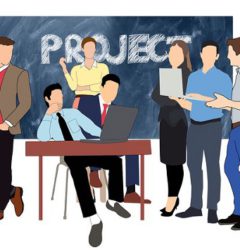6 Ways to Make Your Sales Training Effective [Updated]
04 Jul

Table of Contents
ToggleThe difference between a successful salesperson and someone who can’t thrive in the cutthroat sales business often comes down to how effective their training is. The majority of people who enter a career in sales tend to be outgoing, confident people who feel like they can sell to anyone.
However, confidence and extroversion alone don’t guarantee success in sales. Effective sales skills training equips any salesperson with the right preparation, knowledge, and tools to excel in their roles. For businesses looking to increase their sales, an imperative challenge is to ensure proper training programs for sales staff. But what exactly makes sales skills training effective in 2018? Here are six tips for you.
Focus On The Customer
While sales reps must know your business and the products/services you offer inside out, it’s just as important to understand the customer. Several trends in recent years have shifted buyer behavior, in particular, the Internet and how it has led to more knowledgeable customers who care primarily about the value you bring to them.
Understanding customers means teaching sales reps why your customers buy your company’s specific products/services and how your customers make their buying decisions. You can even go as far as teaching sales reps how to deal with a variety of different personalities.
Use Practical, Situational Training
Practical training that reflects real-world sales situations is more likely to impact your sales reps than sitting through endless Powerpoint presentations. Teaching reps the information they need about your company and your customers is fine, but make sure to incorporate role-based training that teaches reps to deal with common situations they’ll encounter while trying to make a sale.
You can even go as far as hiring some people from outside the company to act as real-world customers who can use commonly encountered sales objections. Sales reps who learn in training how to deal with these objections will have a clear frame of reference in their memories when encountering the same common objections in real sales situations.
Train Active Listening
Research has found that 95% of buyers state that the typical salesperson talks too much, and 74% of buyers said they were much more likely to buy if that salesperson would listen to them. These stats point to the importance of teaching active listening as part of any effective sales skills training program.
As part of teaching active listening, you must distinguish between waiting to speak and actually listening. Sales reps often make the error of worrying about the next question they need to ask while the prospective customer speaks — this is not active listening.
The defining trait of active listeners is that they make effort to concentrate on precisely what the other person is saying. Once the person you’re talking with feels like they are being listened to, you’ve got a much greater chance of making the sale; and reps need to understand this as an important part of training.
Teach How To Qualify Prospects
A significant barrier to effective sales is wasted time, and sales reps need to know how to minimize wasted time in the field. Much of the wasted time in sales comes from chasing after the wrong prospects, meaning there’s a need for sales reps to know how to identify red flags. Often, a sale to a bad client can end up as costly as a lost sale.
Red flags to teach your sales reps about include prospects with a poor attitude or who are rude, prospects who don’t respect the boundaries of sales reps and demand communication as they see fit, and prospects who seem overly eager from the outset to close the deal.
Address Fears
Particular important when training new or inexperienced sales reps is to teach them how to address their fears. Sales reps are ideally confident people but at the end of the day, they are still human. The thought of phoning someone, calling their home, or emailing them and asking them to buy something is associated with some common fears.
Most relevant is the fear of rejection; it’s important to teach sales personnel to embrace rejection and to get used to hearing the word “no”. It’s also a good idea to address the fear of sales reps actually asking for the sale: all the small talk in the world doesn’t mean much if salespeople can’t go for the sale and you can teach some good sales closing techniques.
Evaluate and Communicate
Sales training should never be a once-off process. There are always new problems to address, new techniques to learn, and new objections to overcome. With each dedicated sales training program, you should evaluate its effectiveness by following up with the sales team.
Furthermore, you should have a communication strategy to reinforce the main points from each sales training program. Incorporate multiple channels like emails and lunch and learns.
Wrap Up
Take the time to build a sales training program that incorporates the above points and you’re bound to see improvements in sales team performance. And don’t forget that the learning never stops, both for your business and your sales reps.
This is a guest post by Limor Wainstein
Improve your sales strategy with zipBoard
Request a personalized demo of zipBoard to get your entire team on board with the plan in one place and make it easier for everyone in the process to contribute faster and better.
Get DemoRelated Post
Recent Posts
- How Laerdal Medical Cut eLearning Review Time by 50% with zipBoard’s Visual Review Tool July 9, 2025
- Why Your Team Needs a Content Feedback System (Not Just Comments in Docs) May 28, 2025
- Content Approvals Are Slowing You Down — Here’s the Fix May 26, 2025
- How to Streamline Content Review and Approval — Best Practices, Tools & Automation May 12, 2025
- What Is Content Operations? And Why It Breaks Without a Feedback & Approval System May 3, 2025
©️ Copyright 2023 zipBoard Tech. All rights reserved.


